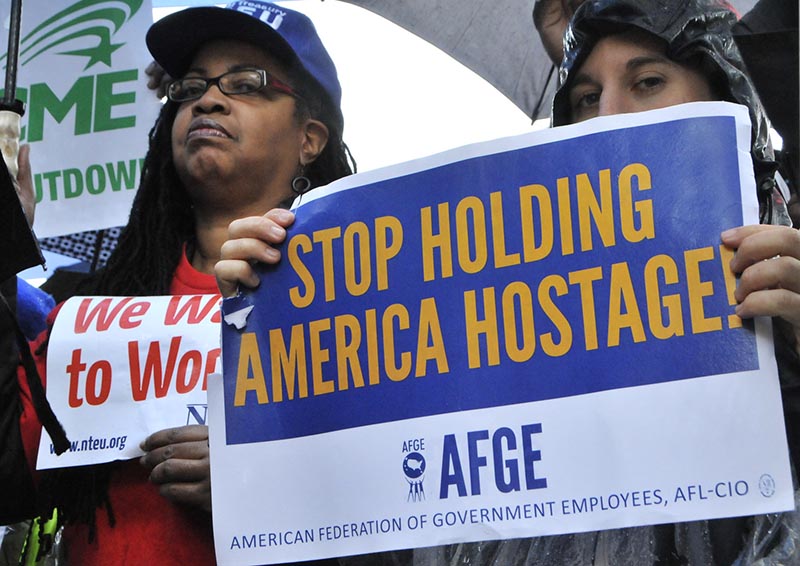Trump’s Wall Demands Hurt People Already Hurting the Most
THE TORCH: CONTENTSBy Holly Straut-Eppsteiner
JANUARY 14, 2019
The Trump shutdown has left more than 800,000 federal workers across the country facing the post-holiday season with no paycheck and a great deal of uncertainty. Members of the federal workforce suddenly find themselves unable to pay for groceries, rent, utilities, and loan payments.
Essential workers, like Transportation Security Administration (TSA) agents, are calling in sick because they can’t afford to pay for transportation or childcare to get to a job that provides no paycheck. Federal workers are selling their belongings on Craigslist, launching GoFundMe campaigns, or taking on odd jobs to pay their bills. Lost wages create burdens for nonprofit agencies like food pantries, which are stepping in to meet workers’ needs with limited resources.
While federal workers may eventually receive back pay, contracted workers — including low-wage workers who clean federal buildings, provide security, and work in food service — will not. Many of these workers and their families live paycheck to paycheck. In short, Trump’s impetuous demand for a border wall has become an assault on the dignity of working Americans.
Workers of color are especially impacted by the shutdown. Black Americans, for example, are disproportionately highly concentrated in the federal workforce. Historically, public sector employment has helped African Americans avoid discrimination in the private sector. The legacy of generations of systemic racism also means that Black families have less wealth than white families and they are less likely to have a financial safety-net to weather this crisis. Well over a third of Executive Branch employees (36.7%) are people of color.
Workers of color are highly concentrated in some of the agencies deemed essential during the shutdown — in other words, they are among those required to continue working but without pay. About half of Border Patrol workers, for example, are Latinx. The National Treasury Employees Union, which represents U.S. Customs and Border Protection employees, filed suit against the Trump administration because its members are being forced to work without pay.
The shutdown not only impacts federal workers and contractors but promises devastating consequences for the millions of Americans who rely on federal programs to meet their basic needs. With a lapse in federal funding, states have had to pick up the cost of Temporary Assistance for Needy Families (TANF) to ensure low-income families receive cash benefits. Housing assistance is of particular concern. By February, rural Americans will lose U.S. Dept. of Agriculture (USDA) rent assistance and by March, millions of individuals could lose access to Section 8 and Housing Choice Vouchers. Residents of 1,000 low-income apartment homes are at risk because their U.S. Dept. of Housing and Urban Development (HUD) contracts have expired and cannot be renewed during the shutdown. Health and safety inspections and homeless services are also a casualty of the furloughed HUD workforce.
The federal government has responded to pressure to fund nutrition programs such as SNAP (“food stamps”), WIC (the Special Supplemental Nutrition Program for Women, Infants, and Children), and school meals through February. However, if the shutdown continues beyond that point — and Trump has threatened that it could last “months or even years” — millions of low-income families are likely to face benefit cuts. In the meantime, thousands of retailers are unable to accept SNAP benefits because their licenses cannot be renewed during the shutdown.
These federal programs provide critical assistance for millions of Americans, including low-income immigrants who are U.S. citizens. Immigrants have high rates of labor force participation, but they are frequently concentrated in low-wage jobs that can make it difficult to make ends meet. Immigrant households are already less likely than U.S.-born citizens to use federal benefit programs. Recently, immigrant households’ participation in programs such as SNAP have been declining, likely because of Trump’s anti-immigrant positions and policies that have created an environment of fear.
The shutdown is also crippling U.S. immigration courts, holding hundreds of thousands of immigrants’ futures in limbo. Currently, 400 immigration judges, with a backlog of 800,000 cases, are furloughed. Immigrants who must already wait an average of two and as many as four years for their cases to be heard must now wait even longer for a court date.
As the shutdown persists with no end in sight, low-income Americans continue to suffer and will face increasingly dire consequences. Trump’s racist and xenophobic demand for a border wall is not only immoral and wasteful, he is holding hostage Black, brown, immigrant, poor, and working-class Americans who cannot afford to miss the paychecks and benefits on which their families depend for survival.
Holly Straut-Eppsteiner is NILC’s Mellon/ACLS Public Fellow and research program manager.






